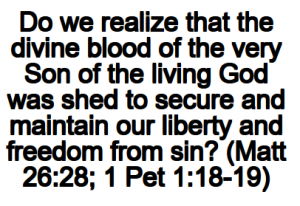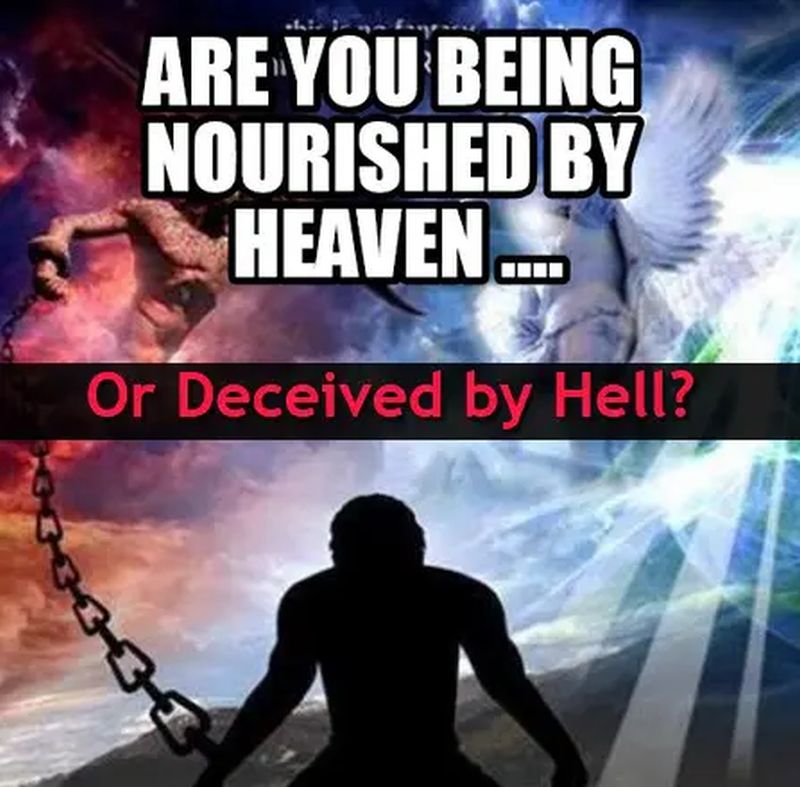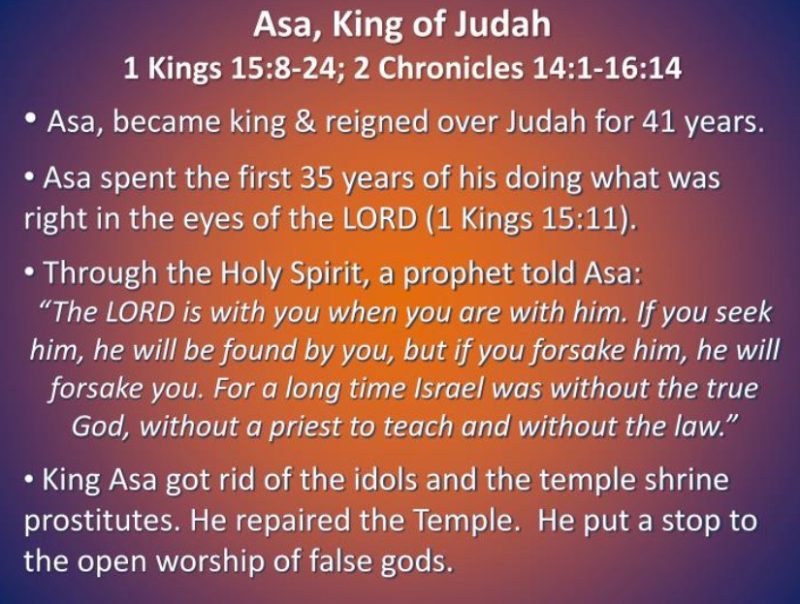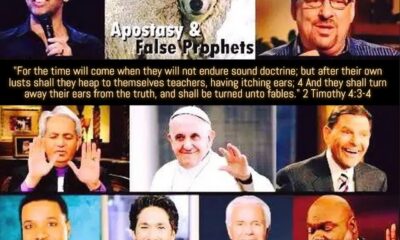by Brother Jonathan – formerly a Baptist Pastor
In this episode Brother Jonathan discusses the most common arguments for the teaching of Eternal Security, the difference between Assurance of Salvation and ES, and Biblical Assurance of Salvation.
People who teach the doctrine of Eternal Security/Once Saved Always Saved/Perseverance of the Saints are unwittingly like men who take the warning signs down from an uncompleted bridge, and worse than that, they are waving people on through to continue as though it were finished. Eternal Security is a dangerous doctrine that must be confronted by all sincere believers.
Bible Study: Eternal Security Arguments
Remnant Bible Fellowship
- Intro
- Plug for last two episodes
- Define “eternal security”
- The teaching that if someone is converted, regardless of what follows, they are guaranteed to go to heaven.
- The difference between “assurance of salvation” and “eternal security”.
- Assurance of salvation deals with the present. Whether or not you have eternal life now.
- Eternal security deals with the future. Whether or not you will have eternal life later.
- If you confuse the two then you will skew your perspective on a lot of the NT. Even Calvinists like Paul Washer openly talk about the importance of not confusing the two notions. Assurance of salvation is an idea that is completely independent of eternal security. You can hold to assurance of salvation without believing eternal security.
- Testimony
- I was discipled as an Independent Fundamental Baptist. I had attended a Fundamentalist Bible Institute, and was enrolled in a Fundamentalist Bible College at the time I was corrected doctrinally. I was not looking for correction when I was corrected. I didn’t think that I was wrong. I had no reason to believe that I was—according to what I thought. I was not corrected by some preacher, or convinced by any one person. I didn’t read some paper arguing the point, and I didn’t read some theological book. I was corrected when I humbled myself to simply look at the scriptures to see what they say for themselves. I intentionally set aside what I was told, applied the hermeneutics that I was taught by Fundamentalists, and when I did I couldn’t come to the same conclusions that I was taught. I saw that the hermeneutics that I was taught—which were good—were being applied inconsistently, or wholly ignored at certain times in certain passages or books. I had been taught doctrine, and if I thought that a verse said something that contradicted that, or if I asked the wrong kind of question, it was simply dismissed without being addressed. I was taught to assume the teaching of eternal security when I came to the scriptures. Now, none of this is said that plainly usually; but every person who has ever been corrected like I was says the same thing.
- It’s about Truth
- The Word of God is the truth. I believe that. It’s because the Word of God is true that I accept correction from it: no matter whom it comes from. If you believe that the Bible is the truth, then you should be ready and willing to listen to anyone who says that they can correct you from it. The only reason that you wouldn’t be willing is if the Bible is not your actual source for your beliefs.
- Most people who hold to eternal security were told it either right after they got saved, or soon after. Most were told that it was true, and was the only Biblically correct view of salvation, even before they read their entire Bible. And most others who came to believe it later did not do so because of a deep personal study of the scriptures. They did not labor in the scriptures seeking to make sure all the definitions of the terms used were being portrayed like the Bible uses them. They did not critically examine it: they accepted it.
- If you care more about the truth, about the Word of God, and about when you have to give an account face-to-face with Jesus Christ about these things then please continue listening. If you care more about your congregation’s acceptance, your comfort, your easy lifestyle, your reputation, your degree from a certain Bible college, your pastorate, or your family…then don’t bother to continue listening.
- We’re talking about false teaching here, and you really need to consider that. The Lord Jesus Himself, the Apostles, and the early Christians all warned that in the latter days—our time—there would be massive deception and delusion doctrinally. We’ve specifically been warned. Consider just two verses:
- “Be not deceived; God is not mocked: for whatsoever a man soweth, that shall he also reap. For he that soweth to his flesh shall of the flesh reap corruption; but he that soweth to the Spirit shall of the Spirit reap life everlasting.” (Gal. 6:7-8)
- “Little children, let no man deceive you: he that doeth righteousness is righteous, even as he is righteous.” (1Jn. 3:7)
- Can I ask you, who is trying to deceive people that they don’t have to walk after the spirit of God—who is the Holy Spirit—in order to reap life everlasting? Or, who is trying to deceive you by saying, “God sees you as righteous no matter how you live practically!” According to two of the Apostles that person is lying to you. They may not know it, but according to two Apostles they are. We’re talking about truth. Do you want the truth, or do you want what allows you to walk carelessly in this world?
- I’m talking in very strong terms about this because I know what it’s like to live as a Christian who believes they’re eternally secure. I did for the first several years after I was converted. I know most don’t think about sin. I know most don’t really fear God. I know most don’t have the faintest idea of what it means to overcome sin. I know that most are not really concerned about being watchful. It’s not necessarily because they believe that they have a license to sin; but the careless lifestyle that doesn’t care about holiness, that doesn’t watch itself, that doesn’t press toward the mark for the prize of the high calling of God in Christ Jesus, it is the natural result. Because they were inoculated against fearing God before most of them ever even read their Bible once through.
- Brief Recap
- The Gospels are Christian Doctrine
- You cannot take promises from the Gospels and leave out the conditions attached to them. You cannot say that certain portions are under the Law, or that certain portions are for a future dispensation, and still claim the promises mentioned in those passages. Stop claiming the promise from the Sermon on the Mount which says, “Ask and it shall be given you, Seek and ye shall find,” if you don’t also accept the passage which says, “if ye forgive not men their trespasses, neither will your heavenly Father forgive your trespasses.”
- Christ specifically told the Apostles to teach their disciples the exact same doctrine and teaching that He gave them in His earthly ministry. It’s called the Great Commission:
- “Go ye therefore, and teach all nations, baptizing them in the name of the Father, and of the Son, and of the Holy Ghost: Teaching them to observe all things whatsoever I have commanded you: and, lo, I am with you alway, even unto the end of the world. Amen.” (Matt. 28:19-20)
- The Gospels are Christian Doctrine
Notice that Christ specifically said, “…ALL things WHATSOEVER I have commanded YOU.” Every single thing that Christ instructed the Apostles is for Christians today.
- Also, Christ specifically told us that the Law of Moses ceased to be preached with John the Baptist in Luke 16:16. He says it is the Gospel of the Kingdom that it is preached. The same gospel of the Kingdom that He said would be preached in all the world until His return—which hasn’t happened yet—in Matthew 24:14.
- Stop blindly believing pastors, preachers, teachers, and commentaries and get your doctrine from the scriptures.
- The Book of Hebrews is for Christians
- Some people try to say that the book of Hebrews is not for Christians. You get a silly two sentence response when asked about it that goes something like this:
- “What’s the title of the book? Right, then leave it to the Jews.”
- I’m not joking. I have heard people dismiss the entire book for that silly explanation. In fact, I used to. Some people even state that the book was originally written to LOST Jews. Really? An entire book of the Bible was written to the people who were hunting down the believers and stoning them? Would you expect them to read it? I really don’t think I have to refute that one. But let’s consider some things:
- He calls them, “holy brethren” (3:1)
- “sons”, that is, sons of God whom He is chastening because He has received them. (12:5-6)
- He refers to them as those who have been sanctified by the blood of Jesus. (10:29)
- He rebuked them for not growing spiritually. (5:11-14)
- The writer includes himself with them in 4:2-3 as having heard the gospel, and he specifically says, “And we which have believed…” in 4:3.
- They had been illuminated spiritually because of it. (10:32)
- After they were illuminated they endured persecution because of it. (10:32-34)
- And if that was not enough, the early Christians openly quoted from the warning passages in the book of Hebrews as applying to all believers.
- Some people try to say that the book of Hebrews is not for Christians. You get a silly two sentence response when asked about it that goes something like this:
- By the way, if a Jew receives the gospel of Christ are they considered a Christian or a Jew to God? Let’s see what the scripture says:
- “For there is no difference between the Jew and the Greek: for the same Lord over all is rich unto all that call upon him.” (Rom. 10:12)
- “There is neither Jew nor Greek, there is neither bond nor free, there is neither male nor female: for ye are all one in Christ Jesus.” (Gal. 3:28)
- “Where there is neither Greek nor Jew, circumcision nor uncircumcision, Barbarian, Scythian, bond nor free: but Christ is all, and in all.” (Col. 3:11)
- Even if the book of Hebrews was just written to Jews who were Christians: it is meant for ALL believers. A Jew who converts to Christ is a Christian. If you fail to remember: the Apostles were Hebrews. The same warnings that they themselves wrote, and applied to themselves, apply to Gentile Christians also. Apostasy is apostasy.
- EVERY time the early church quoted from the book of Hebrews they applied it to ALL Christians. There is no division between Jew and Gentile in Christ. There is one body of believers, and all others are lost.
- Repentance and Faith are two sides of the same coin: both are needed for salvation.
- Repentance is turning from something, and faith is turning to something. You cannot have one, and leave the other undone, and call yourself a Christian. Both are necessary for salvation.
- If you read through the gospels and the book of Acts, and you only go by Christ and the Apostles’ examples, you come to no other conclusion. It is really that simple.
- Assurance of salvation is continually shown in the Bible to be known by your works.
- “Assurance of salvation” is mentioned by the Apostle John:
- “These things have I written unto you that believe on the name of the Son of God; that ye may know that ye have eternal life, and that ye may believe on the name of the Son of God.” (1Jn 5:13)
- That’s the verse that most everybody quotes to support the idea of “Assurance of salvation”. Remember, “assurance” that you are currently a partaker of eternal life is very different than the idea of “eternal security”. ES teaches that because you were converted at one time you will, no matter what, go to heaven in the end. Some people will add some comments to that, but that is generally the idea. Regardless of what they say, ES completely ignores Biblical assurance of salvation.
- “Assurance of salvation” is mentioned by the Apostle John:
- What is said BIBLICALLY about how to have assurance of salvation is very different then what is said commonly. Most preachers today, at least in Fundamentalist circles, go something like this:
- “Have you ever sinned?” “Yeah.” “Do you believe that Jesus died for you?” “Uh huh.” “Okay, repeat after me…” (leads the man to blindly repeat a generic sinner’s prayer that is not only unbiblical but completely ignores the Biblical command of the gospel which is repentance) “Do you mean that?” “Yeah, I guess.” “Well read this…” (Reads Romans 10:9-10) “Did you call on the Lord?” “Uh huh.” “So are you saved?” “I guess.” “God’s not a liar is He?” “I mean…no.” “That’s right! According to God’s Word you have eternal life! It’s a free gift! And since you never did anything to earn it, you can never do anything to lose it! If anyone ever tells you that you’re not saved then just point them to the Bible and tell them they’re wrong and that they’re calling God a liar!”
- To my own shame, I have done that myself before. I have gone out visiting with people who did that to people. I have sat there watching someone tell someone that because they can say “uh huh” to three or four questions that they are now reconciled to God and that they never have to fear God or death again. Shameful.
- Nowhere in the entire Bible will you find that example of presenting the Gospel, or giving assurance of salvation to anyone…ever. How does the Bible tell us to look for assurance of salvation? You see, you have a problem here. People listen to that phrase and they think that I’m meaning eternity. No. Assurance of salvation has to do with the present. If you push the meaning any further than that you are reading into it what is not there. You are assuming eternal security from the outset.
- I understand that if you believe eternal security you believe it. But, when you come to the scriptures you aren’t supposed to bring doctrine to the table. You let the Bible lay out plainly what it says. So let’s just listen to some verses, and pay attention to what they plainly say.
- “This then is the message which we have heard of him, and declare unto you, that God is light, and in him is no darkness at all. If we say that we have fellowship with him, and walk in darkness, we lie, and do not the truth: But if we walk in the light, as he is in the light, we have fellowship one with another, and the blood of Jesus Christ his Son cleanseth us from all sin.” (1Jn. 1:5-7)
- “And hereby we do know that we know him, if we keep his commandments. He that saith, I know him, and keepeth not his commandments, is a liar, and the truth is not in him. But whoso keepeth his word, in him verily is the love of God perfected: hereby know we that we are in him. He that saith he abideth in him ought himself also so to walk, even as he walked.” (1Jn. 2:3-6)
- “Love not the world, neither the things that are in the world. If any man love the world, the love of the Father is not in him.” (1Jn. 2:15)
- When this is connected with James 2:5 we see that only those who love God are going to be partakers of the Kingdom:
- “Hearken, my beloved brethren, Hath not God chosen the poor of this world rich in faith, and heirs of the kingdom which he hath promised to them that love him?” (James 2:5)
- “If ye know that he is righteous, ye know that every one that doeth righteousness is born of him.” (1Jn. 2:29)
- “Little children, let no man deceive you: he that doeth righteousness is righteous, even as he is righteous.” (1Jn. 3:7)
- Compare this with Galatians 6:7-8:
- “Be not deceived; God is not mocked: for whatsoever a man soweth, that shall he also reap. For he that soweth to his flesh shall of the flesh reap corruption; but he that soweth to the Spirit shall of the Spirit reap life everlasting.” (Gal. 6:7-8)
- Any time the Bible says “be not deceived” or “let no man deceive you”, what you have to understand is that means that someone is going to try to deceive you. So the question that you have to ask yourself is, “Who is trying to convince me that you don’t have to obey God in order to be righteous in His sight?”
- Compare this with Galatians 6:7-8:
- “Whosoever is born of God doth not commit sin; for his seed remaineth in him: and he cannot sin, because he is born of God.” (1Jn. 3:9)
- “In this the children of God are manifest, and the children of the devil: whosoever doeth not righteousness is not of God, neither he that loveth not his brother.” (1Jn. 3:10)
- Many people try to teach that “no one knows who the true Christians are.” Really? Why then did Christ command us to “let our lights so shine before men that they may see our good works and glorify our father which is in heaven”? This single verse contradicts that entire idea. “In this the children of God are manifest…” They are obvious, they are made plain for all to see because they do righteousness.
- In fact, when you change this biblical teaching you create some massive contradictions with Christ’s commandments. We’ll see that later.
- “We know that we have passed from death unto life, because we love the brethren. He that loveth not his brother abideth in death. Whosoever hateth his brother is a murderer: and ye know that no murderer hath eternal life abiding in him.” (1Jn. 3:14-15)
- Question: How do we know that we love the brethren, that is, fellow Christians, the way God wants us to? Well, let’s read:
- “By this we know that we love the children of God, when we love God, and keep his commandments.” (1Jn. 5:2)
- So, we know that we love the brethren when we love God and are obeying His commandments.
- “My little children, let us not love in word, neither in tongue; but in deed and in truth. And hereby we know that we are of the truth, and shall assure our hearts before him. For if our heart condemn us, God is greater than our heart, and knoweth all things. Beloved, if our heart condemn us not, then have we confidence toward God.” (1Jn. 3:18-21)
- Some people have the gall to say that this is a comforting verse as opposed to what it is: a warning. They read it like, “Isn’t it so wonderful, if we condemn ourselves in our own heart then God is greater and loves us.” When that is not what it says or means. It says, “for if our heart condemn us, God is greater than our heart, and knoweth all things.” If your conscience, your heart, is convicting you of sin, how much moreso is God aware of it! He knows all things. This is why the Apostle continues and says, “If our heart condemn us not, then have we confidence toward God.” The point being that we should examine ourselves and repent of whatever our conscience or heart convicts us of. Then we will have, as Paul the Apostle said, “…a conscience void of offence toward God and man.” It is for this reason that we can have confidence toward God.
- Most ES proponents teach you to have confidence toward God regardless of the open sin in your life, never mind the secret sin of your heart.
- “We know that whosoever is born of God sinneth not; but he that is begotten of God keepeth himself, and that wicked one toucheth him not.” (1Jn. 5:18)
- Notice that, again, the new birth is spoken of in the present tense; and it is said that they “sin not”. Remember, only those that do righteousness practically, actually, are righteous in the sight of God. (1 John 3:7)
- If you just take those verses at face value. If you take them in their plain, grammatical, sense, then this issue should be over for you. But I know that for many it’s not enough. So, let’s keep going.
- But I want you to notice that in none of those passages was assurance of salvation based on a decision you made one time in the past. I know some people are going to say, “What about this other verse in Philippians?” There is no contradiction. If I have ten clear verses over here that appeal to your behavior as the means of knowing that you are in Christ, and you have a vague passage over here that seems to imply something else—because that’s what you were told that it means—you don’t interpret the majority of clear passages by the minority of vague ones. You always interpret the less clear passages by the more clear passages.
- “Eternal life” is Jesus Christ Himself. It is not an object that can be handed from one person to another.
- “And this is life eternal, that they might know thee the only true God, and Jesus Christ, whom thou hast sent.” (John 17:3)
- “When Christ, who is our life, shall appear, then shall ye also appear with him in glory.” (Col. 3:4)
- “And we know that the Son of God is come, and hath given us an understanding, that we may know him that is true, and we are in him that is true, even in his Son Jesus Christ. This is the true God, and eternal life.” (1Jn. 5:20)
- “And this is the record, that God hath given to us eternal life, and this life is in his Son. He that hath the Son hath life; and he that hath not the Son of God hath not life.” (1Jn. 5:11-12)
- God did not give you eternal life by simply handing you a box and now you can walk away. That’s not salvation. Eternal life is a person: Jesus Christ. If you don’t have Jesus, then you don’t have eternal life. We just read several scriptures from first John that said that if you don’t obey Him then you don’t know Him. John said that if you don’t obey Him, then you aren’t in Him.
- Now, if someone is really clever they’ll appeal to Hebrews 13:5, which says, “…for he hath said, I will never leave thee, nor forsake thee.” They’ll say, “That’s right! Jesus is eternal life and He’s never leaving me!” Okay…you still haven’t answered why John said that you knowing Him—which is defined as eternal life—is conditioned on you obeying His commandments.
- And another thing, did you know that’s a quote from the Old Testament? Most ES proponents won’t allow you to talk about salvation from the Old Testament unless it’s typology, or unless they believe it supports them. You see it’s really funny that someone quotes that. It’s quoting Deuteronomy 31:16, 18. You know why that’s funny? Because right after Moses relates that to the Israelites God says this to Moses:
- “And the LORD said unto Moses, Behold, thou shalt sleep with thy fathers; and this people will rise up, and go a whoring after the gods of the strangers of the land, whither they go to be among them, and will forsake me, and break my covenant which I have made with them. Then my anger shall be kindled against them in that day, and I will forsake them, and I will hide my face from them, and they shall be devoured, and many evils and troubles shall befall them; so that they will say in that day, Are not these evils come upon us, because our God is not among us? And I will surely hide my face in that day for all the evils which they shall have wrought, in that they are turned unto other gods.” (Deut. 31:16-18)
- God said, right after giving a promise that He will never forsake them, that when they forsake Him He will forsake them. You cannot quote from the Old Testament and remove a promise from its context.
- Also, why is it that ES proponents feel that they can so freely quote from the book of Hebrews to teach anything else, but when I point out the many warnings in it they cry foul? Again, inconsistency.
- There are different kinds of works mentioned in the scriptures. The distinction is the motive for which you do them. There are works of self-righteousness and works of faith.
- Many people have come to lump all emphasis on “works” together under the title of it being “law”. They say that if you emphasize works then you aren’t talking about grace. This is one reason why they constantly commit a strawman fallacy by misrepresenting those who deny ES.
- But the Bible clearly distinguishes between self-righteous works and works of faith. Works of self-righteousness are what is meant when the Law of Moses is ACTUALLY referenced.
- “Brethren, my heart’s desire and prayer to God for Israel is, that they might be saved. For I bear them record that they have a zeal of God, but not according to knowledge. For they being ignorant of God’s righteousness, and going about to establish their own righteousness, have not submitted themselves unto the righteousness of God. For Christ is the end of the law for righteousness to every one that believeth.” (Rom. 10:1-4)
- Works of self-righteousness are well summed up here: it is a person going about to establish their own righteousness. They try to earn their way into heaven. I literally don’t know a single person who denies ES who believes that they earn their way into heaven. This is a complete strawman fallacy from ES proponents which shows exactly how little they’ve examined opposing arguments. But the works of faith are shown in the scriptures also:
- “For in Jesus Christ neither circumcision availeth any thing, nor uncircumcision; but faith which worketh by love.” (Gal. 5:6)
- “And they come unto him, bringing one sick of the palsy, which was borne of four. And when they could not come nigh unto him for the press, they uncovered the roof where he was: and when they had broken it up, they let down the bed wherein the sick of the palsy lay. When Jesus saw their faith, he said unto the sick of the palsy, Son, thy sins be forgiven thee.” (Mark 2:3-5)
- Faith cannot be the evidence of anything that is not seen unless faith itself is seen. Saving faith is shown in the actions one does because they believe. If a person doesn’t actually obey God then it shows that they do not actually believe on Him. These kinds of works are the works of faith. The works that are the result of having saving faith. That’s the point of what James was saying in James 2. James wasn’t saying anything about being justified in the sight of men, though it may be an application of the passage. James began by point to the issue of salvation, saying, “…can faith save him?” (James 2:14) He says it very clearly:
- “Seest thou how faith wrought with his works, and by works was faith made perfect? And the scripture was fulfilled which saith, Abraham believed God, and it was imputed unto him for righteousness: and he was called the Friend of God. Ye see then how that by works a man is justified, and not by faith only.” (James 2:22-24)
- James quotes the exact same OT passage to support what he is saying that Paul quotes in Romans 4 to teach saved by grace through faith. Abraham is set forth as an example for us today of Biblical faith and salvation. The difference in Paul’s letter is that he is showing that works of self-righteousness, that is, of the law of Moses (Romans 10:1-4), can earn nothing in the sight of God. While James is telling believers that faith without works working WITH it cannot save them. There is no problem reconciling Paul and James. You just have to do somersaults through the scriptures interpretation-wise when you hold to ES. You end up spending the majority of your time explaining the plain sense of scriptures away.
- Every single person that I have ever met or heard from who has been corrected about ES has said the same thing, “The scriptures are so much easier to understand!” I can tell you the exact same thing from my own experience.
- Remember
- ALL scripture is equally valid. There is no single verse of scripture that is more important than any other. Obviously we have to pay attention to context. But you can’t exalt two or three passages above the rest of the rest of scripture. You can’t have a “proof text theology”. We get converted and people start trying to give us doctrine—which is good—but they do so by giving two or three verses, telling us what they mean, and we just accept it usually.
- You have to think of doctrine like a puzzle. Each verse is a piece, and each piece is equally valid, and they ALL have to go together without one being exalted above the others. What happens is we’re given two or three verses, we’re told what they mean—which we never critically examine—and we keep those three verses pigeon-holed against the rest of scripture. If you approach scripture that way you will make a lot of mistakes.
- Also, you cannot insert things into the verse that aren’t there. If it’s not stated in the verse of scripture, then it’s not in that verse. It seems pretty straightforward, doesn’t it? We’ll see.
- “Salvation is by believing in Jesus Christ.”
- “He that believeth on the Son hath everlasting life: and he that believeth not the Son shall not see life; but the wrath of God abideth on him.” (John 3:36)
- “For God so loved the world, that he gave his only begotten Son, that whosoever believeth in him should not perish, but have everlasting life.” (John 3:16)
- Yeah, that’s right. But what most people don’t mention is that most of the time, when pertaining to salvation, belief is either a present active participle or in the present active indicative. That means that it describes a continuous action. It describes belief that is continual. It never describes a decision you made at one time. Neither does it describe some idea that “because you made a decision at one point you will always continue.” It describes a CONTINUOUS action. So when you read verses like these you have to remember that grammatically it should read to you like this:
- “He that is believing on the Son hath everlasting life: and he that is not believing the Son shall not see life; but the wrath of God is abiding on him.”
- “For God so loved the world, that he gave his only begotten Son, that whosoever is believing in him should not perish, but have everlasting life.”
- Salvation is not fixed because you made a decision at one time in your life at an altar somewhere. That is completely absent from the scriptures. It’s conditioned on your continued belief in Jesus Christ. This is clearly seen from the scriptures because you see warnings of the need for continuance throughout:
- “Moreover, brethren, I declare unto you the gospel which I preached unto you, which also ye have received, and wherein ye stand; By which also ye are saved, if ye keep in memory what I preached unto you, unless ye have believed in vain.” (1Cor. 15:1-2)
- “And you, that were sometime alienated and enemies in your mind by wicked works, yet now hath he reconciled In the body of his flesh through death, to present you holy and unblameable and unreproveable in his sight: If ye continue in the faith grounded and settled, and be not moved away from the hope of the gospel, which ye have heard, and which was preached to every creature which is under heaven; whereof I Paul am made a minister;” (Col. 1:21-23)
- I mean there are dozens of these statements of the condition of salvation being continued belief to the end throughout the NT—not even including statements from the OT. These warnings don’t fit with the ES worldview of looking at the scriptures. They completely fit in their plain sense meaning without it though. If salvation was conditioned on your continued faith to the end then you would expect many such warnings in the scriptures.
- So salvation is not like a tattoo like Charles Stanly says. It’s not one and done. It’s not sit back, relax, and enjoy your salvation. It’s just like the scriptures describe. You enter through the straight gate and start walking on the narrow way. As long as you stay on the narrow way you know exactly where you are headed; but if you step off that path and go to the broad way which leads to destruction then you are going somewhere else.
- Dan Wallace, who is known as one of the leading Greek scholars today, had this to say regarding “belief” as shown by the original languages of the Bible:
- “The present was the tense of choice most likely because the NT writers by and large saw continual belief as a necessary condition of salvation.” (Wallace, Greek Grammar: Beyond the Basics, p.621, footnote 22)
- If the writers of the NT meant that because you made a decision of faith at one point in time that you were fine forever, then they would have said that. But they didn’t. The very language that they used shows it.
- So, yeah, we’re saved by believing in Jesus Christ. Continue to live by faith and you’ll be fine. Just make sure you define “believing” as God does and not how your pastor or favorite teacher does.
- “We are not saved by works.”
- “Not by works of righteousness which we have done, but according to his mercy he saved us, by the washing of regeneration, and renewing of the Holy Ghost;” (Tit. 3:5)
- “For by grace are ye saved through faith; and that not of yourselves: it is the gift of God: Not of works, lest any man should boast.” (Eph. 2:8-9)
- That’s right. We’re not saved by works. I’ve never once taught that. The problem is people want to separate works entirely from faith—which the bible doesn’t.
- The Apostles wrote about how “faith works by love” (Galatians 5:6). This is what the Apostle James was talking about in James 2. He says very clearly, “Seest thou how faith wrought with his works, and by works was faith made perfect?” (James 2:22) He’s not describing faith and works, as some falsely say. He’s describing the works of faith, and how faith moves people to act on their faith. It is because the person has truly set the Lord, and the gospel, as their hope that they live as though it is true. God works in them by their faith to enable them to obey Him.
- People incorrectly believe that all works are of the law. What they need to understand is the distinction biblically of self-righteous works, which is going about to establish our own righteousness (Romans 10:1-4), and the works of faith, the kind that show the faith that we have. A good example of this is how Christ said that He SAW the faith of the four men who brought the paralytic man to Him to be healed in Mark 2:1-5.
- Paul was continually warning people about self-righteous works, which are of the law, and James is warning believers to not stop acting and living by their faith as though they actually believe God. Their works with their faith to make it perfect as James says. Both Paul and James reference Abraham as the example of this. Abraham was told something by God, he believed God, he acted on it, and God rewarded him for his faith it says. He didn’t bless Abraham for his works in that sense. God blessed Abraham for the faith that led Abraham to obey Him.
- Even in the book of Romans Paul tells us to continue in works:
- “But after thy hardness and impenitent heart treasurest up unto thyself wrath against the day of wrath and revelation of the righteous judgment of God; Who will render to every man according to his deeds: To them who by patient continuance in well doing seek for glory and honour and immortality, eternal life: But unto them that are contentious, and do not obey the truth, but obey unrighteousness, indignation and wrath, Tribulation and anguish, upon every soul of man that doeth evil, of the Jew first, and also of the Gentile; But glory, honour, and peace, to every man that worketh good, to the Jew first, and also to the Gentile: For there is no respect of persons with God.” (Rom. 2:5-11)
- Paul here explicitly telling us that we are to continue in well doing “seek[ing] for glory and honour and immortality, eternal life.” But he says that those who “do not obey the truth” will receive wrath from God. It is not self-righteousness to submit yourself to authority of God, to Christ His Son, to Christ alone for the cleansing of sin, to follow His commandments His way, to seek His face daily for strength to obey Him through His Spirit, and at the end of the day give Him the glory and honor for it all. That’s not called self-righteousness its called salvation. The problem with most people is that they didn’t come to God for Him to change them now in this present life: they came to God to keep them from Hell later. People who don’t intend to have their lives change after coming to Christ have never understood the gospel in the first place.
- “Salvation is a free gift.”
- “For the wages of sin is death; but the gift of God is eternal life through Jesus Christ our Lord.” (Rom. 6:23)
- “Therefore as by the offence of one judgment came upon all men to condemnation; even so by the righteousness of one the free gift came upon all men unto justification of life.” (Rom. 5:18)
- This is where the saying, “If you did nothing to earn it how can you do anything to lose it?” The question itself presupposes that salvation is not conditional. Salvation is obviously conditional because if it weren’t conditional then everyone would go to heaven. The main issue though is people want to believe that it is based on some decision you made at one point instead of faith—and those two ideas are different. Either you have faith right now or you don’t. The Bible nowhere promises that you will be saved in the future based on some decision you made in the past. It sometimes warns people that BECAUSE they began to believe at one time in the past that they SHOULD continue to believe SO THAT they will be saved in the end though.
- Regarding salvation as a gift, consider how Christ Himself talks about salvation:
- “So likewise ye, when ye shall have done all those things which are commanded you, say, We are unprofitable servants: we have done that which was our duty to do.” (Luke 17:10)
- It is after we have done all that is our duty to do that we will still tell God that we are “unprofitable servants”. Nothing of the obedience of faith, or obedience to the faith, earns us anything in the sight of God. It is merely the condition of His grace being given. There is no contradiction in saying that a gift is free, and paid for by another, and it being given to them upon some condition of their receiving it. I give things to my wife because she’s my wife. I give things to my children because they’re my children. You can have any number of reasons for giving things to people without at any time the idea coming to your head that they earned it.
- If you simply read the verses (Romans 6:23 and 5:18) you don’t get the idea of it being unconditional. We’ve all just been told so many times that that’s what it means. It’s simply just inserting an idea into the text that is not there. The only thing that it says is that salvation is a free gift. Simply put. The maximum extent that you can take that to, without reading into it what you want, is that nothing you ever do will EARN salvation from God. That in no way contradicts it being conditional though, or the idea that God may require something of you in order for Him to save you. The requirement being faith. Faith, as we’ve seen already, is not separable from the works of faith.
- It’s like the fireman illustration. If you are sitting at home on your couch and a fireman bursts through the door and yells, “Your house is on fire, get out or you’ll die!” If you believed him then you would get out of the house. If you said that you believed him, but stayed sitting calmly on the couch, then you could only come to one of two options:
- You didn’t really believe him and you lied.
- You did believe him, but didn’t care.
- It’s exactly that way with biblical salvation. Either you believe God and His Son Jesus Christ and you repent of sin to turn to Christ, you say you believe but are lying, or you do believe but you refuse to submit to Him. Which is it?
- Salvation is a free gift, but as the bible defines things, that in no ways contradicts that God expects you to follow Him.
- “Salvation is not enduring or a process, but an event in time. Salvation is a NEW BIRTH. Just as your first birth happened on a certain time and day, so does the second birth.”
- “For he saith, I have heard thee in a time accepted, and in the day of salvation have I succoured thee: behold, now is the accepted time; behold, now is the day of salvation.” (2Cor. 6:2)
- “Jesus answered and said unto him, Verily, verily, I say unto thee, Except a man be born again, he cannot see the kingdom of God.” (John 3:3)
- This is a very common argument—for some reason. It sets forth the idea that the new birth is exactly like physical birth. Almost like salvation is a complete change of your DNA. If the new birth were like physical birth, in that sense, then you would never sin again after conversion. Your life would just be the outflow of a change in your nature. But you do still struggle against sin, and that shows that the new birth is very different than physical birth.
- In addition to that, it really depends on how you define “birth”. If you define “birth” as “the beginning of life” then it is quite easy to see how someone could lose salvation. You die. Since salvation is likened to being alive from the dead, it makes sense that if you die spiritually (or “wither” as Christ says in John 15) then salvation is ended—if we were to stick with the analogy. Something that is born can die. Just the same as you were at one time “dead in trespasses and sins” (Eph. 2:1), if you turn again to sin and remain unrepentant then you will die again. God gives space to repent, but you can refuse. God chastises His children, but you can refuse to heed the correction.
- In addition to that, the new birth is mentioned throughout 1 John in the present tense. It is not referenced as some past event that guarantees a future. You either ARE born of God, or you are NOT born of God. It is a state. Now, all states have a beginning. You did at one point in time—if you are a believer—begin to live unto God. Again though, nowhere does the Bible say that BECAUSE you began to live unto God sometime in the past that YOU WILL go to heaven regardless of what you do. On the contrary, it continually warns you of falling away from the faith if you don’t continue.
- Christ is eternal life (Col. 3:4; 1 John 5:13 20). We are only partakers of His life by being united to Him. This faith is mentioned in the present continuous tense. You either ARE a child of God at this present moment, or you are NOT a child of God at this present moment. For this reason, the need for continuance is consistently stressed in the NT, and assurance is given to us based upon our continual faith in Him that IF we continue we shall absolutely reach our goal. We can have assurance of where we stand now presently, and if we continue in faith then we know where we’re going. Consider these verses with that in mind, and just listen to what they grammatically say:
- “Who will render to every man according to his deeds: To them who by patient continuance in well doing seek for glory and honour and immortality, eternal life:” (Rom. 2:6-7)
- “Moreover, brethren, I declare unto you the gospel which I preached unto you, which also ye have received, and wherein ye stand; By which also ye are saved, if ye keep in memory what I preached unto you, unless ye have believed in vain.” (1Cor. 15:1-2)
- “Be not deceived; God is not mocked: for whatsoever a man soweth, that shall he also reap. For he that soweth to his flesh shall of the flesh reap corruption; but he that soweth to the Spirit shall of the Spirit reap life everlasting. And let us not be weary in well doing: for in due season we shall reap, if we faint not.” (Gal. 6:7-9)
- “And you, that were sometime alienated and enemies in your mind by wicked works, yet now hath he reconciled In the body of his flesh through death, to present you holy and unblameable and unreproveable in his sight: If ye continue in the faith grounded and settled, and be not moved away from the hope of the gospel, which ye have heard, and which was preached to every creature which is under heaven; whereof I Paul am made a minister;” (Col. 1:21-23)
- “Let that therefore abide in you, which ye have heard from the beginning. If that which ye have heard from the beginning shall remain in you, ye also shall continue in the Son, and in the Father. And this is the promise that he hath promised us, even eternal life.” (1Jn. 2:24-25)
- It is an enduring to the end. If you are living by the faith of Christ now, having repented of sin, then you are a partaker of eternal life now. If you continue in faithful obedience to God, then you know exactly where you are going. If you turn away to follow something else, like the lusts of your flesh, and you don’t repent, then you have intentionally cast off Christ. This is continually the language of NT salvation: You began to believe at one point, you may know that you are in Christ presently, and IF you continue in Him then you can be confident of your destination. Remember, the children of God aren’t people who made a decision at one point:
- “In this the children of God are manifest, and the children of the devil: whosoever doeth not righteousness is not of God, neither he that loveth not his brother.” (1Jn. 3:10)
- “Little children, let no man deceive you: he that doeth righteousness is righteous, even as he is righteous.” (1Jn. 3:7)
- At this point I would like to quote from Robert Shank’s book Life in the Son. At the time Shank wrote the book he was a Southern Baptist. He came to see that the scriptures could not be understood in their context to teach an unconditional salvation. Regarding the new birth he had three points that are interesting:
- “Physical birth effects the inception of the life of the subject in toto, whereas spiritual birth involves only a transition from one mode of life to another.
- (It may be objected that spiritual birth is not a transition from an old life to a new life on the grounds that, when one is born of the Spirit, he passes “out of death into life,” becoming “a new creature in Christ.” This is true; but only within the limits of the total definition of the Scriptures. For it is also true that the man who is “dead in trespasses and in sins” is nevertheless a rational spiritual being who is personally accountable for his life and his sins and who, except he repent, must answer before God in solemn judgment. What is depicted as “death,” for the reason that the sinner is “alienated from the life of God,” is nevertheless spiritual life on a degenerate plane—a spiritual life for which the lost must answer to God in judgment. The New Testament contains many references to the old life of Christians before conversion, which references have to do with the spiritual lives of men in an unregenerate state.)
- In physical birth, the subject has no prior knowledge and gives no consent, whereas in spiritual birth, the subject must have a prior knowledge of the Gospel and must give consent.
- (It may be objected that, in view of John 1:13 and James 1:18, the spiritual birth of men is by the will of God, rather than by the will of men. Such an objection proceeds from the old fallacy of “either…or,” a ridiculous assumption unwittingly entertained by many sincere Bible scholars. Actually, the spiritual birth of men is by the will of both God and man. “Of his own will begat he us with the word of truth.” Yes, but not apart from the consent of our wills. Of his own will, the groom takes a bride; but not apart from the will and consent of the bride. God was under no constraint to bestow spiritual birth upon men, at such frightful cost to Himself, other than the constraint of His own love and grace. “Of his own will,” therefore, the Father of lights gives good gifts to men and begets as His own dear children all who believe His word of truth. The initiative is with God. But God’s initiative demands a response from man. Men are not born of the Spirit apart from a prior knowledge of the Gospel [Rom. 10:8-17] nor apart from their own consent [John 5:40].)
- “Physical birth effects the inception of the life of the subject in toto, whereas spiritual birth involves only a transition from one mode of life to another.
- In physical birth, the individual receives a life independent of his parents. They may die, but he lives on. But in spiritual birth, the subject receives no independent life. He becomes a partaker of the life and nature of Him who begets—a participant, by faith, in the eternal life of God in Christ “who is our life.”
- In view of obvious essential differences, it cannot be considered strange that spiritual birth, unlike physical birth, is not irrevocable. It is folly to assume that an equation exists between physical birth and spiritual birth, and that whatever is intrinsic in physical birth is equally so in spiritual birth. Physical birth and spiritual birth are equally real, but essentially different. While an analogy exists between the two, there is no equation whatever.” (Shank, Life in the Son, 2nd ed., pp. 90-91)
- “They were never saved to begin with!”
- “They went out from us, but they were not of us; for if they had been of us, they would no doubt have continued with us: but they went out, that they might be made manifest that they were not all of us.” (1Jn. 2:19)
- I will acknowledge up front, as I have at other times on this podcast: I believe that the majority of people who “make a decision for Christ”, who then fell away later, were never saved to begin with. I say that for a number of reasons: (1) because they “made a decision for Christ” instead of repenting like the Bible says, (2) most never bring forth the fruits of repentance, and (3) if we were to go by the standards set forth in scripture to know if we have eternal life they never fit the description.
- Now, having said that, this argument is usually just a cop-out. Though the passage in first John makes very clear that these people were never saved to begin with. When it says “They went out from us, but they were not of us…” the antecedent grammatically is the “antichrists” of verse 18 just before it. An “antichrist” is someone who denies that Jesus Christ is the unique Son of God, or that He is God manifest in the flesh. Someone who comes into a congregation bringing that doctrine is obviously not a Christian. That’s exactly why the Apostle John wrote what he did.
- What some ES teachers try to do though is to make this verse apply to all sin in general really. They say that if you turn to fornication, lying, adultery, etc., and refuse to repent that it proves you were never saved to begin with—regardless of whatever happened before then. Again, this is what they say. There are some major problems with this though:
- All believers are warned against continuing in sin. This shows that it is completely possible for them to continue in sin after true conversion.
- That teaching is contrary to the Biblical teaching of assurance of salvation. Biblical assurance of salvation, like we went over earlier, is based on whether or not you are presently loving God, obeying His commandments, and loving the brethren. If someone at one time prior, for however long, had publicly expressed repentance of sin and hope in Christ through the gospel, then began to follow God, but then turned to sin and refused to repent: it proves biblically that they were converted and fell away. Again, according to the biblical teaching of assurance of salvation as set forth in 1 John: if last year you were living for Christ, and this year you are living in sin (such as lying or fornication), then you have departed from Christ.
- According to this ES teaching how could you be confident of eternal salvation at all? This argument defending ES comes from the idea that a Christian will act like a Christian, and that’s right; but then they try to fit in ES with it, and that doesn’t work. You have to either take away the free will of man—which some do—or you have to say the person was never saved to begin with. It creates the problem where we need to ask why these people could be so confident of their salvation before when they were obeying God before? If they never began obeying God, then they were never converted. If they did begin obeying God after making a profession of faith, and turned away, then they left the faith. If you’re still alive then you have the possibility of sinning against God and refusing to repent in the future. The only way that’s not possible is if you are never tempted—and you are daily.
- These problems are clear to some in the ES camp, and the answer they have come up with is to say that there are perpetually carnal Christians. Christians who act just like the lost. The massive problem with that is that it ignores half the NT teaching on what a Christian is. As we went over earlier, the Bible clearly says that a child of God is known by how they live. They are loving God, obeying Him, and loving the brethren—all in the present.
- “In this the children of God are manifest, and the children of the devil: whosoever doeth not righteousness is not of God, neither he that loveth not his brother.” (1Jn. 3:10)
- “If ye know that he is righteous, ye know that every one that doeth righteousness is born of him.” (1Jn. 2:29)
- The NT clearly lays out consistently that salvation is a present tense thing. If you believe on Him, having repented of your past sins and are bringing forth the fruits of repentance by following Him, you are born of him. That’s what the Bible literally says. If you continue to do so, then you can have confidence of you eternal destination. If you don’t continue, then you depart from Christ.
- There is also the strange notion implied by this that all false professors will leave the church of Christ—if you interpret 1 John 2:19 that way. But that is obviously not true given the warnings the Apostles left us about false teachers. This verse in 1 John is not prescriptive, it is descriptive. It was not meant to give a broad sweeping teaching for all the church for all time. John was specifically addressing this one fellowship about what was going on there in their midst. It is fallacious to take this one passage of the NT and assert a false interpretation to the exclusion of everything else.
- “Nothing can separate us from the love of God.”
- “For I am persuaded, that neither death, nor life, nor angels, nor principalities, nor powers, nor things present, nor things to come, Nor height, nor depth, nor any other creature, shall be able to separate us from the love of God, which is in Christ Jesus our Lord.” (Rom. 8:38-39)
- I find this argument particularly funny. People almost never quote the entire verse from Romans 8. They simply say, “Nothing can separate us from the love of God!” And I respond with, “Finish the verse: …which is in Christ Jesus our Lord.” The love of God is in Christ Jesus. Why is that important? Let’s just consider what Christ Himself said about the love of God:
- “He that hath my commandments, and keepeth them, he it is that loveth me: and he that loveth me shall be loved of my Father, and I will love him, and will manifest myself to him.” (John 14:21)
- Jesus Himself said that the love of God was conditioned upon your obedience to his commandments. In case you think He misspoke, He reemphasizes it when one of His disciples asked Him a question next:
- “Judas saith unto him, not Iscariot, Lord, how is it that thou wilt manifest thyself unto us, and not unto the world? Jesus answered and said unto him, If a man love me, he will keep my words: and my Father will love him, and we will come unto him, and make our abode with him.” (John 14:22-23)
- Again, Christ says very plainly that as a result of our loving Christ and keeping His commandments the Father will love us and will indwell us. Yes, there is a general sense in which God so loved the world that He gave His only begotten Son. But just because God expressed His love for the world doesn’t mean the world is going to be saved does it? There is a type of love which comes from a Father to His children. Paul expressed it this way:
- “Wherefore come out from among them, and be ye separate, saith the Lord, and touch not the unclean thing; and I will receive you, And will be a Father unto you, and ye shall be my sons and daughters, saith the Lord Almighty.” (2Cor. 6:17-18)
- It was well said by Robert Shank regarding the 8th chapter of Romans:
- “The eighth chapter of Romans, as someone has said, ‘begins with no condemnation and ends with no separation.’ It is well to observe, however, that it is punctuated with sharp warnings that ‘if ye live after the flesh ye shall die, but if ye through the spirit do mortify the deeds of the body, ye shall live’ (v. 13); that only such as are led by the Spirit of God are truly sons of God (v. 14); that only if we suffer with Christ shall we be glorified together with Him (v. 17); and that, despite our infirmities but aided by the Spirit, we must continue to wait in patience and hope (vv. 24-27) for the ultimate realization of salvation and the full manifestation of our divine sonship (vv. 16-23), ‘the glory which shall be revealed to us…if so be that we suffer with Him’ (cf. 2 Tim. 2:12).”
- We are consistently told in the scriptures that we must heed the warning of the Gospel to repent of sin and turn to Christ. In doing this, we come out from among the world and are separate. In so humbling ourselves before God He receives us as His children. This love of God is conditioned upon our following Him. This leads us to the next verse.
- “My Father, which gave them me, is greater than all; and no man is able to pluck them out of my Father’s hand.” (John 10:29)
- This is probably one of the verses of the Bible that is consistently ripped from its context. People quote this and say, “I’m in the Father’s hand and He ain’t letting go! You’re not stronger than God are you!” I used to think like that too until I read the verse in context:
- “My sheep hear my voice, and I know them, and they follow me: And I give unto them eternal life; and they shall never perish, neither shall any man pluck them out of my hand. My Father, which gave them me, is greater than all; and no man is able to pluck them out of my Father’s hand.” (John 10:27-29)
- John 10:27 puts a pretty notable qualifier on the verses that follow. Christ gives these promises to “his sheep”. He says though that His sheep “follow” Him. Do you know why that’s important? Do you remember what I said about the word “believeth” earlier? It’s the same thing here. The Greek word underlying our English word “follow” here is present active indicative. It’s describing a continuous action. In fact, the words underlying “know” and “hear” are the same. So according to basic grammar it means this:“My sheep are hearing my voice, and I know them, and they are following me…”
- Again, it is a reference to those who presently follow Him. That’s the definition of a Christian, because the word Christian means, “follower of Christ”. The word “follow” even means, “to walk after, practice, obey, act in conformity to.” This lines up perfectly with what we have said elsewhere about assurance of salvation. You can only have a biblical assurance of salvation if you are presently loving God, obeying His commandments, and loving the brethren. To THOSE people are these promises given. If you stop loving Him first, obeying His commandments, or loving the brethren, then you don’t meet the conditions of the promises do you? Neither do you then meet the conditions for assurance of salvation as given to us in 1 John.
- John 10:27-29 is a wonderful promise, but it’s only a promise that there is nothing that will rip you away from God against His or your will.
- “Jesus promised He will never leave us. Jesus could not say this if there was even a chance of losing our salvation.”
- “Let your conversation be without covetousness; and be content with such things as ye have: for he hath said, I will never leave thee, nor forsake thee.” (Heb. 13:5)
- “Teaching them to observe all things whatsoever I have commanded you: and, lo, I am with you alway, even unto the end of the world. Amen.” (Mat. 28:20)
- This argument presupposes that Christ is the one leaving, and it also assumes an unconditional salvation. People read this promise and add to it the phrase: “no matter what you do.” It’s another example of people reading into a text what is not there. You have to look at every single verse of scripture in light of every other verse of scripture equally. The conditionality of God’s being with a believer is shown in several ways. Here is an example from the OT which shows God’s mind about ALL of His promises: even the ones where He promised something to be for ever:
- “And there came a man of God unto Eli, and said unto him, Thus saith the LORD, Did I plainly appear unto the house of thy father, when they were in Egypt in Pharaoh’s house? And did I choose him out of all the tribes of Israel to be my priest, to offer upon mine altar, to burn incense, to wear an ephod before me? and did I give unto the house of thy father all the offerings made by fire of the children of Israel? Wherefore kick ye at my sacrifice and at mine offering, which I have commanded in my habitation; and honourest thy sons above me, to make yourselves fat with the chiefest of all the offerings of Israel my people? Wherefore the LORD God of Israel saith, I said indeed that thy house, and the house of thy father, should walk before me for ever: but now the LORD saith, Be it far from me; for them that honour me I will honour, and they that despise me shall be lightly esteemed.” (1Sam. 2:27-30)
- Did you hear what God said to Eli? He said, “I know that I promised you this and that ‘for ever’ but you have abused it.” They falsely assumed that God’s promises were unconditional. Here, God says very clearly that it was conditional even though He said it was “for ever”.
- Another thing to consider about the passage from Hebrews 13:5 is that it is a quote from the OT also. As I said earlier, it’s a quote from Deuteronomy 31:6, 8. God said, right after giving a promise that He will never forsake them, that when they forsake Him He will forsake them. You cannot quote from the Old Testament and remove a promise from its context. Again, this shows the conditionality of ALL of God’s promises. The principle here is that God is not forsaking anyone arbitrarily, but it is repeated that if you forsake Him, He will respond to you in kind:
- “And thou, Solomon my son, know thou the God of thy father, and serve him with a perfect heart and with a willing mind: for the LORD searcheth all hearts, and understandeth all the imaginations of the thoughts: if thou seek him, he will be found of thee;
Abiding
“The things which are not Seen are Eternal” [podcast]

“While we look not at the things which are seen, but at the things which are not seen: for the things which are seen are temporal; but the things which are not seen are eternal.” 2 Corinthians 4:18
All good things must come to an end…. except for those who are going to share in the eternal glory of Jesus Christ!!!
“But as it is written, Eye hath not seen, nor ear heard, neither have entered into the heart of man, the things which God hath prepared for them that love him.” 1 Corinthians 2:9
No More Tears, Ever – Only for God’s People!
“And God shall wipe away all tears from their eyes; and there shall be no more death, neither sorrow, nor crying, neither shall there be any more pain: for the former things are passed away.” Revelation 21:4
STORE | Support | The Return of Christ | Stewardship | Jesus Sat Over Against The Treasury [podcast] | 10 Clues Your Love for God has Waxed Cold [podcast] | Where to Give and Where Not to Give | Fruit Abounding to Your Account! | Parable of the Talents [podcast] | Proving Jesus Matters [podcast] | Money, Material Wealth, and Riches | Rusted Gold and Fire Untold [podcast]



Abiding
The Curse of a Divided Heart and Blessing of a Whole Heart! [podcast]

Israel’s heart was divided. The solution.
“Their heart is divided; now shall they be found faulty: he shall break down their altars, he shall spoil their images … 12 Sow to yourselves in righteousness, reap in mercy; break up your fallow ground: for it is time to seek the LORD, till he come and rain righteousness upon you.” Hosea 10:2, 12
King Asa: Tragic end of an otherwise obedient, fruitful, God-glorifying life….
Are you blessed or cursed?
“Thus saith the LORD; Cursed be the man that trusteth in man, and maketh flesh his arm, and whose heart departeth from the LORD.” Jeremiah 17:5
King Asa trusted the physicians and not the LORD and he paid dearly.
“And Asa in the thirty and ninth year of his reign was diseased in his feet, until his disease was exceeding great: yet in his disease he sought not to the LORD, but to the physicians.” 2 Chronicles 16:12
Feet speak of foundation. Without feet, physically we cannot stand. Without a sound foundation of truth, of God’s Word in our lives, we shall not stand. Read Matthew 7:19-29.
One writes notes the following about the meaning of feet in God’s Word:
“Why Are Feet Important in the Bible? Just as men and women stand upon their feet as the foundation of upright posture, Bible verses also use feet as a euphemism to represent a strong foundation in various circumstances. Feet are not referenced as we see them today, but they are used as symbols to represent greater metaphorical concepts, such as guidance or direction.
The feet represented something that was common to all people but used differently. For example, one of the most noted scripture texts involving feet is Psalm 119:105, ‘Thy word is a lamp unto my feet, and a light unto my path.’ This emphasizes how the feet are used to travel and traverse. Yet, without the word, the traveler is left walking in the dark without a known path.
Essentially, the feet are referenced as a critical part of life as walking was commonplace. We naturally travel where our feet lead us and the Bible verses use feet to represent a means of traveling through life itself. If we walk down a dark path, we are likely to stumble. If we walk down a holy path, we are sure to please God. All of this is facilitated symbolically by the feet.”
The foundation truth we learn in God’s Word and obedience to it determines the direction of our lives.
“As ye have therefore received Christ Jesus the Lord, so walk ye in him: 7 Rooted and built up in him, and stablished in the faith, as ye have been taught, abounding therein with thanksgiving.” Colossians 2:6-7
Becoming Rooted and Grounded in Christ
Like Asa, many today trust the counsel of mere men, such as doctors and not God. This doesn’t mean going to a doctor is a sin and yet, the true disciple will primarily trust and obey and be led of the LORD, not men.
“But without faith it is impossible to please him: for he that cometh to God must believe that he is, and that he is a rewarder of them that diligently seek him.” Hebrews 11:6
Read Hebrews 3-4 prayerfully for the eternal danger of having “an evil heart of unbelief” AFTER being saved. Repentance required.
“They speak vanity every one with his neighbour: with flattering lips and with a double heart do they speak.” Psalms 12:2
Got depression? Are you seeking the LORD in true repentance whereby He will grant you great joy? (Psalms 51; 2 Timothy 1:7) Or, are you seeking out and trusting the mere human, the finite pundits of this fleeting world?
“But ye are forgers of lies, ye are all physicians of no value.” Job 13:4
Those who trust human physicians and not the Great Physician, are cursed, not blessed. Their faith in mere men reveals their utter rebellion.
“See, I have this day set thee over the nations and over the kingdoms, to root out, and to pull down, and to destroy, and to throw down, to build, and to plant.” Jeremiah 1:10
2 Chronicles 15:17 – Upon becoming king in Judah, Asa, having inherited an idolatrous, lukewarm people, system… he began to command that…
- The people do that which is right in God’s eyes (2 Chronicles 14:2)
- That all idolatrous altars we torn down (2 Chronicles 14:3)
- That God’s people seek His face (2 Chronicles 14:4)
- That idol altars in the cities of Judah be removed – “and the kingdom was quiet before him” (2 Chronicles 14:5) ….. Proverbs 1:33
- Fenced cities be built …. so the land could be at rest, at peace, and not fear the enemy (2 Chronicles 14:6)
- The people be involved in building fenced, walled, protected cities – “Therefore he said unto Judah, Let us build these cities, and make about them walls, and towers, gates, and bars, while the land is yet before us; because we have sought the LORD our God, we have sought him, and he hath given us rest on every side. So they built and prospered.” (2 Chronicles 14:7) …… 1 Chron 16:11
- Great military be built (2 Chronicles 14:8)
“The LORD is with you, while ye be with him; and IFFFF ye seek him, he will be found of you; but IF ye forsake him, he will forsake you.” 2 Chronicles 15:2
“But the high places were not taken away out of Israel: nevertheless the heart of Asa was perfect all his days.” 2 Chronicles 15:17
“Well; because of unbelief they were broken off, and thou standest by faith. Be not highminded, but fear: 21 For if God spared not the natural branches, take heed lest he also spare not thee. 22 Behold therefore the goodness and severity of God: on them which fell, severity; but toward thee, goodness, if thou continue in his goodness: otherwise thou also shalt be cut off.” Hebrews 11:20-22
“The wicked shall be turned into hell, and all the nations that forget God.” Psalms 9:17
“Now consider this, ye that forget God, lest I tear you in pieces, and there be none to deliver.” Psalms 50:22
“Believe in the LORD your God, so shall ye be established; believe his prophets, so shall ye prosper.” 2 Chronicles 20:20
God blesses those who trust Him and curses, removes His blessings from those who once trusted Him and yet now have forgotten Him. When we willingly offer ourselves as living sacrifices to the LORD our God, He avenges us of all our enemies (Judges 5:2) …. “But IF thou shalt indeed obey his voice, and do all that I speak; then I will be an enemy unto thine enemies, and an adversary unto thine adversaries.” (Exodus 23:22)
“WHEN” does God avenge us of our enemies? “WHEN” does God judge our enemies?
“Praise ye the LORD for the avenging of Israel, WHEN the people willingly offered themselves.” Judges 5:2
When we offer our lives a living sacrifice unto the LORD – that is, we simply surrender this life to Him – the subduing of our enemies begins.
“I beseech you therefore, brethren, by the mercies of God, that ye present your bodies a living sacrifice, holy, acceptable unto God, which is your reasonable service. 2 And be not conformed to this world: but be ye transformed by the renewing of your mind, that ye may prove what is that good, and acceptable, and perfect, will of God.” Romans 12:1-2
Asa reigned as king in Judah for 39 years (2 Chronicles 14-16).
In his final days, after obeying God and bringing much needed reform to the people of God, Asa forgot the LORD, and had grown cold in his faith and was therefore cursed with a divided heart.
All those who trust mere men, just because they have a white coat on and are called “doctor”, are going to die as did king Asa who trusted in earthly physicians, instead of the Great Physician! Repent now sinner.
“Trust in the LORD with all thine heart; and lean not unto thine own understanding. 6 In all thy ways acknowledge him, and he shall direct thy paths. 7 Be not wise in thine own eyes: fear the LORD, and depart from evil.” Proverbs 3:5-7
Are you a pessimistic pansy or an optimistic overcomer? Are you like the 10 spies or the 2 who entered the promised land while the 10 sad sack whiners were shut out? “The righteous are bold as a lion.” (Proverbs 28:1) Jesus asks “WHERE is your faith?” (Luke 8:25) Repenting for real and putting all your trust in the LORD is essential – and no one will be in the promise land of Heaven without sound, solid faith in God. “Without faith it is impossible to please him.” (Hebrews 11:6). “Thus saith the LORD; Cursed be the man that trusteth in man, and maketh flesh his arm, and whose heart departeth from the LORD.” (Jeremiah 17:5)
Read Revelation 2-3.
Remember the woman Jesus, the Great Divine Physician made whole of her issue who had previously spent all she had on human physicians?
“And a certain woman, which had an issue of blood twelve years, 26 And had suffered many things of many physicians, and had spent all that she had, and was nothing bettered, but rather grew worse, 27 When she had heard of Jesus, came in the press behind, and touched his garment. 28 For she said, If I may touch but his clothes, I shall be whole. 29 And straightway the fountain of her blood was dried up; and she felt in her body that she was healed of that plague. 30 And Jesus, immediately knowing in himself that virtue had gone out of him (accessed by faith in Him), turned him about in the press, and said, Who touched my clothes? 31 And his disciples said unto him, Thou seest the multitude thronging thee, and sayest thou, Who touched me? 32 And he looked round about to see her that had done this thing. 33 But the woman fearing and trembling, knowing what was done in her, came and fell down before him, and told him all the truth. 34 And he said unto her, Daughter, thy faith (in God not men) hath made thee whole; go in peace, and be whole of thy plague.” Mark 5:25-34
You claim to be trusting God but you take a mood drug? I don’t think so. MOOD DRUGS ARE FOR THE WICKED UNBELIEVERS. PERIOD. REPENT.
When a person resorts to using a drug to uplift their mood, they are loving and believing the world more than God, forfeiting the blessing of God for a cheap substitute, and manifesting their contempt for the LORD, their unbelief. A born again, presently abiding  disciple of Jesus has all the fruit of the Holy Spirit which include, “Love, joy, peace…” (Galatians 5:22-23) God gives His people “power… love, and a sound mind.” (2 Timothy 1:7) God’s Word has the answer to “ALL things that pertain unto life and godliness” and that specifically includes a “sound mind.” (2 Peter 1:3-4) Holy Scripture specifically uses the terms “sound mind” and “sound heart” which come only from learning and adhering to “sound doctrine.”
disciple of Jesus has all the fruit of the Holy Spirit which include, “Love, joy, peace…” (Galatians 5:22-23) God gives His people “power… love, and a sound mind.” (2 Timothy 1:7) God’s Word has the answer to “ALL things that pertain unto life and godliness” and that specifically includes a “sound mind.” (2 Peter 1:3-4) Holy Scripture specifically uses the terms “sound mind” and “sound heart” which come only from learning and adhering to “sound doctrine.”
We live in a fallen world and were born in sin. Via the things that have happened to us and that we ourselves have perpetrated on others, fragmentation of our hearts has occurred. Only One can make us whole.
“And there was delivered unto him the book of the prophet Esaias. And when he had opened the book, he found the place where it was written, 18 The Spirit of the Lord is upon me, because he hath anointed me to preach the gospel to the poor; he hath sent me to heal the brokenhearted, to preach deliverance to the captives, and recovering of sight to the blind, to set at liberty them that are bruised, 19 To preach the acceptable year of the Lord.” Luke 4:17-19
“And the very God of peace sanctify you wholly; and I pray God your whole spirit and soul and body be preserved blameless unto the coming of our Lord Jesus Christ. 24 Faithful is he that calleth you, who also will do it.” 1 Thessalonians 5:23-24
“He healeth the broken in heart, and bindeth up their wounds.” Psalms 147:3
Counting it all Joy
“My brethren, count it all joy when ye fall into divers temptations; 3 Knowing this, that the trying of your faith worketh patience. 4 But let patience have her perfect work, that ye may be perfect and entire, wanting nothing. 5 If any of you lack wisdom, let him ask of God, that giveth to all men liberally, and upbraideth not; and it shall be given him. 6 But let him ask in faith, nothing wavering. For he that wavereth is like a wave of the sea driven with the wind and tossed. 7 For let not that man think that he shall receive any thing of the Lord. 8 A double minded man is unstable in all his ways.” James 1:2-8
Through the trials we face in this life, we must learn to “count it all joy when ye fall into divers temptations”, trust God not men, ask for and rely on His wisdom and not waver, but rather finished our course trusting and walking with Christ to the end of our lives.
“I have fought a good fight, I have finished my course, I have kept the faith:” 2 Timothy 4:7
“For God is not unrighteous to forget your work and labour of love, which ye have shewed toward his name, in that ye have ministered to the saints, and do minister. 11 And we desire that every one of you do shew the same diligence to the full assurance of hope unto the end: 12 That ye be not slothful, but followers of them who through faith and patience inherit the promises.” Hebrews 6:10-12
The Whole Heart
“And all Judah rejoiced at the oath: for they had sworn with all their heart, and sought him with their whole desire; and he was found of them: and the LORD gave them rest round about.” 2 Chronicles 15:15
The result of seeking the LORD with a whole heart is that He gives us “rest round about.”
“But whoso hearkeneth unto me shall dwell safely, and shall be quiet from fear of evil.” Proverbs 1:33
9 Times in the book of Psalms the words “Whole Heart” appear. Here’s the first 3 of that collection:
“I will praise thee, O LORD, with my WHOLE HEART; I will shew forth all thy marvellous works.” Psalms 9:1
“Praise ye the LORD. I will praise the LORD with my WHOLE HEART, in the assembly of the upright, and in the congregation.” Psalms 111:1
“Blessed are they that keep his testimonies, and that seek him with the WHOLE HEART.” Psalms 119:2
PRAYER: Dear heavenly Father, I have sinned against You by not wholly trusting You nor sought You with my whole heart. Here and now I confess this for the evil sin of unbelief and rebellion that it is and ask You to please forgive me now in the name of Jesus. Please wash me afresh from all my sins with the precious blood of Jesus Christ. Also please make my heart whole and increase and fill me with Your faith Father, and cause me to trust You will all of my heart, no matter what. I love You my dear LORD. In Jesus’ name. Amen.
Lukewarm is Hell Bound | OSAS/eternal security is a lie from hell |
Support | STORE | Podcasts | Jail/Prison Ministry | Mexico Mission here | All Ministry Updates | The Return of Christ | Stewardship | Apostate Modern Church Exposed | Beware of the BUZZ WORD Bandits [podcast] | Preach the Word | Wolves Exposed | Church Membership Exposed | 100’s of Christ-centered, Scripture-rich Podcasts | Knowing God | The Cross Life | Christology = the Study of Christ



Abiding
“NEVER take a Vacation from God” [podcast]

God’s Word teaches us to be diligent in knowing and following Christ – even when the word diligent is not used.
“Seek the Lord and his strength, seek his face continually.” 1 Chronicles 16:11
Make the deliberate decision to “set…
“Now set your heart and your soul to seek the Lord your God; arise therefore, and build ye the sanctuary of the Lord God, to bring the ark of the covenant of the Lord, and the holy vessels of God, into the house that is to be built to the name of the Lord.” 1 Chronicles 22:19
“Don’t you EVER take a vacation from God!” said my first pastor.
This beloved brother knew exactly what happens when the disciple relaxes in his seeking of the LORD. Think foolish virgins. The result can be deadly, irrevocably.
He was dead on in this warning. Give the flesh an inch and it will take a mile, right?
Have you ever slipped backward? If so, you know it started with just not reading God’s Word one day. That one day turned into two, three…. Right?
Never must this happen. The war is won in the now. You must “Be sober, be vigilant; because your adversary the devil, as a roaring lion, walketh about, seeking whom he may devour” (1 Peter 5:8).
“Submit yourselves therefore to God. Resist the devil, and he will flee from you.” James 4:7
God requires that we “give diligence to make your calling and election sure: for if ye do these things, ye shall never fall” (2 Peter 1:10).
It’s only those who remain built up in Christ like the wise virgins of Jesus’ parable, who “keep” themselves “in the love of God” who are not going to fall away.
“But ye, beloved, building up yourselves on your most holy faith, praying in the Holy Ghost, 21 Keep yourselves in the love of God, looking for the mercy of our Lord Jesus Christ unto eternal life. … Now unto him that is able to keep you from falling, and to present you faultless before the presence of his glory with exceeding joy, 25 To the only wise God our Saviour, be glory and majesty, dominion and power, both now and ever. Amen.” Jude 20-25
Jesus warns:
“Watch and pray, that ye enter not into temptation: the spirit indeed is willing, but the flesh is weak.” Matthew 26:41
How did this kind of wisdom get lost from us beloved of God?
The disciple must get out ahead of the flesh. He must be one step ahead – knowing by testimony of the Word and by personal experience that there is “NO good thing” in us other than Jesus (Romans 7:18). This is exactly why Paul also said things like:
“I die daily.” 1 Corinthians 15:31
“But I keep under my body, and bring it into subjection: lest that by any means, when I have preached to others, I myself should be a castaway.” 1 Corinthians 9:27
Exhorting the sheep of Christ, one pastor said:
“Have fun this summer. Enjoy the outdoors. Travel to see friends and family. Explore the world. Just don’t take a vacation from God. He loves you more than you can imagine and wants to keep refilling your sack with his awesome gifts so that you can keep sharing them with others in your life!”
“The desire accomplished is sweet to the soul: but it is abomination to fools to depart from evil.” Proverbs 13:19
Various Quotes on the Importance of Diligence
“Nothing in the world can take the place of persistence. Talent will not; nothing is more common than unsuccessful men with talent. Genius will not; unrewarded genius is almost a proverb. Education will not; the world is full of educated derelicts.”―Calvin Coolidge
“But I never could have done what I have done, without the habits of punctuality, order, and diligence…”―Charles Dickens
“Prefer diligence before idleness, unless you esteem rust above brightness.”―Plato
“Diligence is the mother of good fortune.”―
“Amateurs look for inspiration; the rest of us just get up and go to work.”
“If he [Thomas Edison] had a needle to find in a haystack, he would not stop to reason where it was most likely to be, but would proceed at once with the feverish diligence of a bee, to examine straw after straw until he found the object of his search.”―Nikola Tesla
“Laziness looks at excuses as something to treasure while diligence always focuses on excuses as an inconvenience to be overcome.”―
“The three great essentials to achieve anything worthwhile are, first, hard work; second, stick-to-itiveness; third, common sense.”―Thomas Alva Edison
“That which ordinary men are fit for, I am qualified in, and the best of me is diligence.”―William Shakespeare
“Active valour may often be the present of nature; but such patient diligence can be the fruit only of habit and discipline.”―Edward Gibbon
“Diligence overcomes difficulties; sloth makes them.”―Benjamin Franklin
“The slothful man saith, There is a lion in the way; a lion is in the streets.” Proverbs 26:13
“In all labour there is profit: but the talk of the lips tendeth only to penury.” Proverbs 14:23
“Wherefore gird up the loins of your mind, be sober, and hope to the end for the grace that is to be brought unto you at the revelation of Jesus Christ;” 1 Peter 1:13
“Wherefore – Having such encouragement. Gird up the loins of your mind – As persons in the eastern countries were wont, in travelling or running, to gird up their long garments, so gather ye up all your thoughts and affections, and keep your mind always disencumbered and prepared to run the race which is set before you. Be watchful – As servants that wait for their Lord. And hope to the end – Maintain a full expectation of all the grace – The blessings flowing from the free favour of God. Which shall be brought to you at the final revelation of Jesus Christ – And which are now brought to you by the revelation of Christ in you.“―John Wesley
“Slothfulness (laziness, lack of diligence) casteth into a deep sleep; and an idle soul shall suffer hunger.” Proverbs 19:15
Power Words Power our Lives!
Remember those power words your parents instilled in your growing up? Remember things like “readers are leaders”? How about “The early bird gets the worm”?
What are some of the good words your beloved parents instilled in you as a child that live on in your mind and heart daily?
My beloved father taught us five to “always be consistent.” Oh and these weren’t just words. Oh no. My brother and I are only 13 months apart and so when we started playing football at about 6 years old, my parents set us down and looked us in the eyes and said “If you start this football season, you WILL finish. We require it of you, so count the cost.”
Nothing replaces consistency. Say it out loud with me right now beloved of God – CONSISTENCY.
While we’re on this topic, I hope you won’t mind me saying that it is befuddling to see how people start doing something that works and then quit – from a work out program to a lifestyle change in eating and most devastatingly, serving God then quitting.
Wait a minute, you were doing _______ and it was working, was blessing you, and then you quit?
Hebrews 10:32-39
“But call to remembrance the former days, in which, after ye were illuminated, ye endured a great fight of afflictions;
33 Partly, whilst ye were made a gazingstock both by reproaches and afflictions; and partly, whilst ye became companions of them that were so used.
34 For ye had compassion of me in my bonds, and took joyfully the spoiling of your goods, knowing in yourselves that ye have in heaven a better and an enduring substance.
35 Cast not away therefore your confidence, which hath great recompence of reward.
36 For ye have need of patience, that, after ye have done the will of God, ye might receive the promise.
37 For yet a little while, and he that shall come will come, and will not tarry.
38 Now the just shall live by faith: but if any man draw back, my soul shall have no pleasure in him.
39 But we are not of them who draw back unto perdition; but of them that believe to the saving of the soul.”
Hebrews 6:9-12
“But, beloved, we are persuaded better things of you, and things that accompany salvation, though we thus speak. 10 For God is not unrighteous to forget your work and labour of love, which ye have shewed toward his name, in that ye have ministered to the saints, and do minister. 11 And we desire that every one of you do shew the same diligence to the full assurance of hope unto the end: 12 That ye be not slothful, but followers of them who through faith and patience inherit the promises.”
62 times the words “diligent,” “diligence,” and “diligently” appear in Holy Scripture.
Each time we read these words, they pertain specifically to serving God “diligently” with “diligence.”
“Diligent”
“He becometh poor (spiritually) that dealeth with a slack hand: but the hand of the diligent maketh rich (spiritually).” Proverbs 10:4
“Diligence”
“Keep thy heart with all diligence; for out of it are the issues of life.” Proverbs 4:23
“Diligently”
appears 37 times in God’s Word
“But without faith it is impossible to please him: for he that cometh to God must believe that he is, and that he is a rewarder of them that DILIGENTLY seek him.” Hebrews 11:6
“Looking DILIGENTLY lest any man fail of the grace of God; lest any root of bitterness springing up trouble you, and thereby many be defiled;” Hebrews 12:15
“Keep your dukes up!”
Growing up boxing, from home training to being on a golden gloves team in high school, the command of the coaches was always and repeatedly “Keep your dukes up!”
Those who drop their dukes, their hands from covering their face, get hit, get knocked out.
Another sign on the wall of that boxing facility was: “When the going gets tough, the tough get going.” unknown
We are going to go through what Jesus foretold:
“For then shall be great tribulation, such as was not since the beginning of the world to this time, no, nor ever shall be. 22 And except those days should be shortened, there should no flesh be saved: but for the elect’s sake those days shall be shortened.” Matthew 24:21-22
YOUR PRAYER: Holy Father, in the name of Jesus I come to You now. Please forgive my sins of self-idolatry, slothfulness, and spiritual adultery.
Support | STORE | Podcasts | Making Peace with God | It is Finished! | Discipleship | The Gospel Centers Upon Christ’s Blood | Christology | The Gospel: What is It?





 America12 months ago
America12 months agoThe Drugging of America: The Pharmakeia Sorcery Deception [podcast]

 Articles2 years ago
Articles2 years agoChildren being Rescued in Tunnels: Happening Now – UPDATE!

 Articles8 years ago
Articles8 years agoSelf-Examination in Preparation for the Lord’s Return

 Apostasy2 years ago
Apostasy2 years agoSHOCKING List of False Prophets Most Believe are True















































